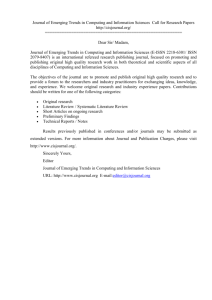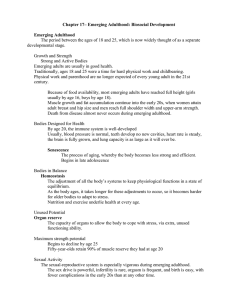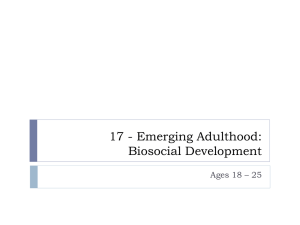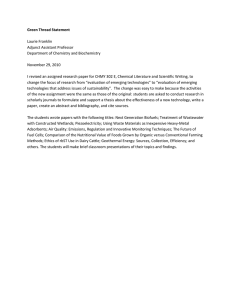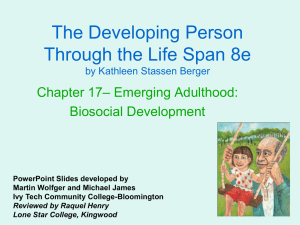Andrade, Maria Claudia, & Matias, M. roles in emergent Adulthood
advertisement
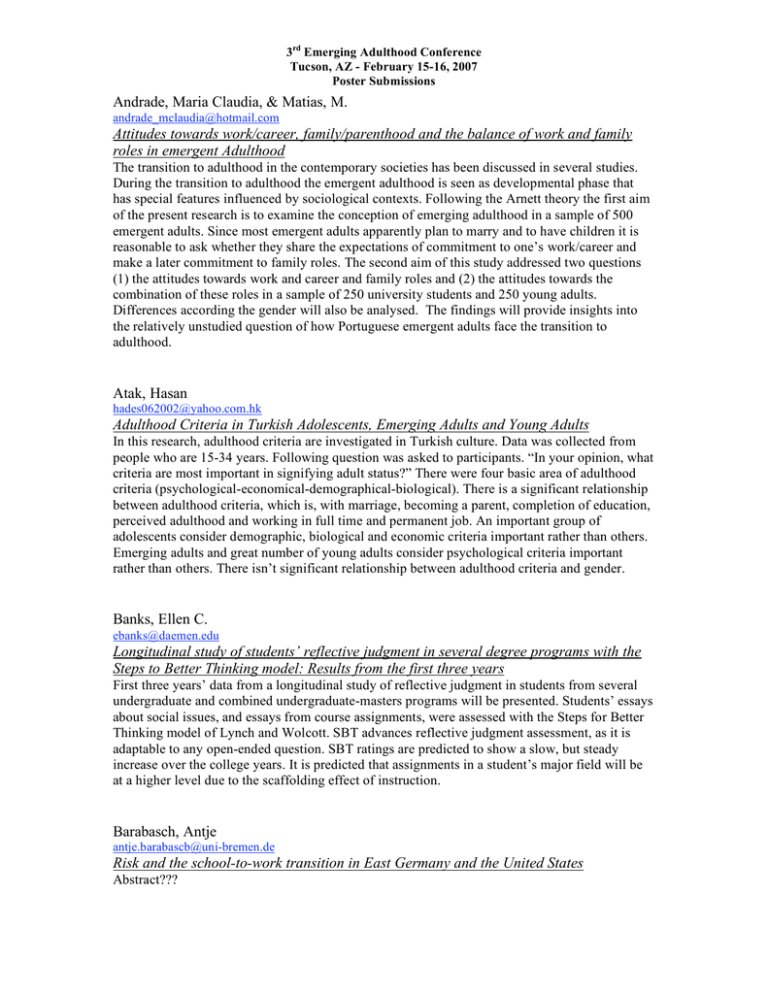
3rd Emerging Adulthood Conference Tucson, AZ - February 15-16, 2007 Poster Submissions Andrade, Maria Claudia, & Matias, M. andrade_mclaudia@hotmail.com Attitudes towards work/career, family/parenthood and the balance of work and family roles in emergent Adulthood The transition to adulthood in the contemporary societies has been discussed in several studies. During the transition to adulthood the emergent adulthood is seen as developmental phase that has special features influenced by sociological contexts. Following the Arnett theory the first aim of the present research is to examine the conception of emerging adulthood in a sample of 500 emergent adults. Since most emergent adults apparently plan to marry and to have children it is reasonable to ask whether they share the expectations of commitment to one’s work/career and make a later commitment to family roles. The second aim of this study addressed two questions (1) the attitudes towards work and career and family roles and (2) the attitudes towards the combination of these roles in a sample of 250 university students and 250 young adults. Differences according the gender will also be analysed. The findings will provide insights into the relatively unstudied question of how Portuguese emergent adults face the transition to adulthood. Atak, Hasan hades062002@yahoo.com.hk Adulthood Criteria in Turkish Adolescents, Emerging Adults and Young Adults In this research, adulthood criteria are investigated in Turkish culture. Data was collected from people who are 15-34 years. Following question was asked to participants. “In your opinion, what criteria are most important in signifying adult status?” There were four basic area of adulthood criteria (psychological-economical-demographical-biological). There is a significant relationship between adulthood criteria, which is, with marriage, becoming a parent, completion of education, perceived adulthood and working in full time and permanent job. An important group of adolescents consider demographic, biological and economic criteria important rather than others. Emerging adults and great number of young adults consider psychological criteria important rather than others. There isn’t significant relationship between adulthood criteria and gender. Banks, Ellen C. ebanks@daemen.edu Longitudinal study of students’ reflective judgment in several degree programs with the Steps to Better Thinking model: Results from the first three years First three years’ data from a longitudinal study of reflective judgment in students from several undergraduate and combined undergraduate-masters programs will be presented. Students’ essays about social issues, and essays from course assignments, were assessed with the Steps for Better Thinking model of Lynch and Wolcott. SBT advances reflective judgment assessment, as it is adaptable to any open-ended question. SBT ratings are predicted to show a slow, but steady increase over the college years. It is predicted that assignments in a student’s major field will be at a higher level due to the scaffolding effect of instruction. Barabasch, Antje antje.barabascb@uni-bremen.de Risk and the school-to-work transition in East Germany and the United States Abstract??? 3rd Emerging Adulthood Conference Tucson, AZ - February 15-16, 2007 Poster Submissions Basikin, B., Watt, H., & Richardson, P. bbas2@student.monash.edu Beginning Teachers’ Motivations and Aspirations Through Teacher Education Much research has focused on what motivates people to take on a teaching career. An open question remains – how do their motivations and aspirations change through their professional education? We sampled secondary teacher education candidates near the end of their qualification (N=72) in Melbourne Australia (age: M=21.44, SD 2.77). Participants rated their responses for “then” (recalling their entry to teacher education) and “now” for a range of items. They answered open-ended questions regarding future plans and aspirations, and their teaching related abilities. Responses revealed significant changes in most perceived motivations and aspirations, with all changes in an upward direction. Findings are interpreted in light of the current climate of teacher shortages. Bauer, Joseph shadysc0rpi0@aol.com Effects of a Brief STD Prevention Program On University Students Abstract??? Beck, Connie, Fabrett, F., & Silverberg Koerner, S. beck@u.arizona.edu Ethnic Differences in Emotional Struggles of Emerging Adults after a Parental Divorce Most emerging adults from divorced families are resilient but not invulnerable to ongoing emotional struggles. The Latino population in the U.S. is increasing considerably yet no studies have systematically examined divorce-related issues for Latino emerging adults (Aquilino, 2006). There are reasons to believe these emerging adults could be at higher risk of negative consequences. There are stronger culturally-driven negative beliefs about divorce and stronger family pressures to remain married (Neff, et al., 1991). Using qualitative and quantitative methods this study compares levels of anxiety, depression, emotional struggles and painful memories for a sample of Caucasian and Latino (N=309) emerging adults. Branscomb, Kathryn, & McBride, B. branscom@uiuc.edu Pathways to Adulthood and Identity Among 18-25 year old Undergraduate Student Parents: Theoretical and Applied Implications Abstract??? Busby, Dean, & Holman, T. dean_busby@byu.edu Pathways to Relationship Aggression in an Emerging Adulthood Sample In this study pathways to relationship aggression were analyzed using a large sample of emerging adults. Family of origin victimization, witnessing, and perpetrating of violence were evaluated as to their influence on relationship aggression. The results indicated that perpetrating violence in the family of origin was the only variable directly related to relationship aggression. However, 3rd Emerging Adulthood Conference Tucson, AZ - February 15-16, 2007 Poster Submissions the family environment was related to the personality of self and partner. These personality manifestations had strong associations with negative communication. Negative communication had a strong association with relationship aggression. Emerging adults who were perpetrators of even mild violence in the family and who selected partners with negative personality traits were particularly vulnerable to experiencing aggression as adults. Calzo, Jerel, & Ward, L.M. calzo@umich.edu Sexual socialization, behavior, and the mediation of sexual intentions among virgin emerging adults Most research on sexual socialization and emergent sexual behavior has focused on the role of parents and on the transition to first coitus. Our study examined the contributions of parents, peers, and the media, to the non-coital sexual behaviors of 218 virgin emerging adults. We also examined the role of sexual intentions as a potential mediator of the associations between discourses and behavior. Results indicate that messages from parents admonishing premarital sex predicted less petting behavior. However, messages from parents and friends condoning casual sex predicted more necking, petting, and oral sex. Intentions to lose virginity mediated these associations. Chaudhari, Prema, & Pizzolato, J. ppc1@pitt.edu Outcomes of Situational Ethnic Identity in Higher Education Because there is an increase in the number of multiethnic individuals across campuses, researchers and practitioners are focusing their interest on developmental issues related to ethnic identity regarding mixed ethnic people. Through quantitative measures and semi-structured interviews data is collected. Grounded theory via constant comparative analysis is employed in order to determine relationships ethnic identity and epistemological development. Preliminary findings show that, physical characteristics, a prevalent factor of ethnic identity, affects how a person may identify within a specific context; which in turn may relate to various developmental outcomes, such as academic achievement and cognitive development. Cleveland, H., Herbert, R., & Harris, K. bo.cleveland@ttu.edu The Daily Use of Abstinence Strategies among Emerging Adults in Substance Abuse Recovery Abstract??? Cohen, David, & Smith, T. cohend@etown.edu The Religious, not just Protestant, Work-Ethic in Religious Emerging Adults This study investigates the impact of religiosity on emerging adults. Using Add Health’s longitudinal database (n=4,882), it was hypothesized that religiosity will be positively related to higher life-goals (i.e., academics and career goals) and achievement of these stringent life-goals. Regressional analyses will be conducted to determine the influence of religiosity on life-goals and achievement. 3rd Emerging Adulthood Conference Tucson, AZ - February 15-16, 2007 Poster Submissions Cordaro, Millie, & Matthews, S. mcordaro@uwf.edu Gender Differences in Relational Motivation Orientation Among Emerging Adults This study examined differences between males and females regarding motives of partner selection based on relational motivation orientation. Relational motivation orientation addresses one’s motives for engaging in particular romantic relationships. Chi-square analyses scores by category and sex yielded significant differences between males and females on several indices including: self standards of physical attractiveness, self status among peers, what partner thinks of self physical attractiveness, and what friends think of potential partner’s status. Females who are selecting potential romantic partners are operating from performance-oriented motives, and are more likely than males to rely on peer evaluation and status. Crocetti, E., Palmonari, A., & Pojaghi, B. elisabetta.crocetti@unimc.it Title??? Abstract??? Dalton, Andrea, & Galambos, N. andrea.dalton@ualberta.ca Sexual Behaviour Trajectories During the Transition to University The present study sought to uncover trajectories of change over time in emerging adults’ sexual behaviours. Predictors of these trajectories were also sought. Participants were 182 first-year university students who completed monthly, web-based checklists over six months. Multilevel models calculated that the average trajectory of change in oral sex increased at a rate of 15% per month, while the average trajectory for penetrative sex displayed no change. Gender, psychosocial maturity, attitudes toward sex, and intentions to have sex predicted variation in these trajectories. Results of this study highlight the importance of using time-structured data to study emerging adult sexuality. Dalton, Andrea, & Galambos, N. andrea.dalton@ualberta.ca Within-Time Associations Between Affective Experiences and Sexual Behaviour The present study sought to uncover a time-varying relationship between emerging adults’ engagement in sexual behaviours and their experiences of positive and negative affect. Predictors of this time-varying relationship were also sought. Participants were 182 first-year university students who completed monthly, web-based checklists over six months. Time-varying relationships were confirmed through multilevel models. Positive affect ratings were higher during months in which participants engaged in oral sex. Gender, psychosocial maturity, attitudes toward sex, and intentions to have sex moderated these time-varying relationships. Results of this study highlight the importance of undertaking research on emerging adult sexuality from a positive development perspective. Demir, Meliksah meliksahdemir@gmail.com 3rd Emerging Adulthood Conference Tucson, AZ - February 15-16, 2007 Poster Submissions Identity Formation, Relationship Quality and Well-Being Among Emerging Adults Present study compared the close relationships and well-being of emerging adults high and low in identity formation (n= 360). Results revealed that emerging adults high in identity formation had higher quality friendships, romantic relationships and were higher in well-being as compared to those low in identity formation. Results also revealed that those high in identity formation benefited more from their close relationships. Findings suggest that the degree to which emerging adults are successful in forming their identity has implications for well-being, relationship quality, and the degree to which one benefits from close relationships. Dietz, Lauren, Maggs, J., Patrick, M., & Lee, C. ledietz@uncg.edu Sexual Motivation Profiles of Incoming College Students Emerging adulthood allows opportunities for exploration of romantic and sexual relationships, although individuals may differ in their profiles of motivations for and against sexual behavior. The present study utilized survey data from incoming White and Asian-American college students (N = 1781, 58.2% female). Cluster analysis was used to identify distinct profiles of sexual motivations among emerging adults, and multinomial logistic regression was used to test how cluster membership was associated with gender, race, and prior penetrative sex and oral sex experience. Five clusters of sexual motivation profiles were defined: Conflicted, Pleasure Seeking, Ready, Morally Opposed, and Not Ready. Doane, L., Adam, E., Mineka, S., Zinbarg, R., & Craske, M. l-doane@northwestern.edu Life Stress, Cortisol and the Onset of Depressive Disorders in a Diverse Sample of Emerging Adults Abstract??? Dogan-Ates, A., Cebioglu, S., Erdogan, E., & Tekin, M. doganaysun@gmail.com Conceptions of the Transition to Adulthood among Turkish Emerging Adults Abstract??? Ducat, Wendy, & Zimmer-Gembeck, M. w.ducat@griffith.edu.au A model of romantic relationship quality, interpersonal self dimensions, need fulfilment and well-being in emerging adults Deci & Ryan’s (2000) self-determination theory, that personal growth occurs through fulfillment of psychological needs for autonomy, competence and relatedness, guides this study. The primary purpose was to test a model of romantic relationship quality (RRQ), self (authenticity, attachment, self-differentiation), need-fulfillment (NF) and well-being in emerging adults. Pilot self-report data was obtained from 218 emerging adults (M age = 20.2 years, 47.7% female) in a romantic relationship (M length = 20 months). Preliminary regression analyses showed that perceptions of need-fulfillment in romantic relationship mediated the relationship between RRQ and well-being. Self-differentiation was uniquely associated with well-being. Key findings and implications are discussed. 3rd Emerging Adulthood Conference Tucson, AZ - February 15-16, 2007 Poster Submissions Dumas, Tara M., Tieu, T-T., & Pratt, M.W. tara_dg_22@hotmail.com Why Me? Narrative Coherence in Emerging Adults’ Low Point Narratives, Adjustment and Cognitive Development A longitudinal study examined the relationship between late adolescents’ cognitive development and emotional adjustment and the coherence of their low point life narratives in emerging adulthood. Causal coherence and thematic coherence are important components of a “good” life story. Preliminary correlations indicated a significant relationship between causal coherence at age 26 and several cognitively-oriented measures in adolescence. Thematic coherence at age 26 was significantly related to positive emotional adjustment in adolescence. Thus, cognitive development and emotional adjustment may play somewhat distinctive roles in enhancing different types of coherence (and presumably a sense of coherence) in emerging adults’ low point narratives.
